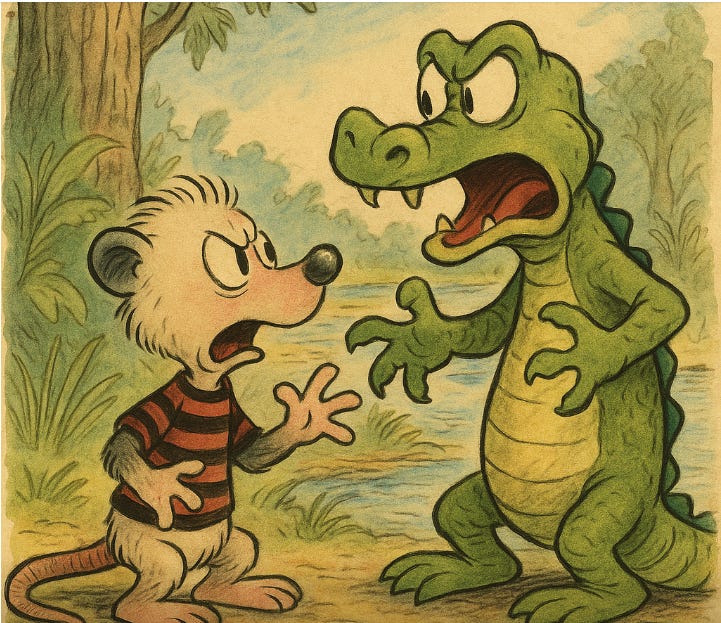We have met the enemy, and it is us.
Pogo said that in 1970. A cartoon possum nailed the dark heart of American life better than most politicians ever manage.
But the idea wasn’t new. In 1838, Abraham Lincoln stood up in Springfield, Illinois, and tried to warn us. He was 28 years old, lanky, and intense, and he saw exactly where the real danger lay. He said:
“At what point shall we expect the approach of danger? By what means shall we fortify against it? Shall we expect some transatlantic military giant to step the ocean and crush us at a blow? Never. All the armies of Europe, Asia and Africa combined, with all the treasure of the earth in their military chest, with a Bonaparte for a commander, could not by force take a drink from the Ohio or make a track on the Blue Ridge in a trial of a thousand years. If destruction be our lot, we must ourselves be its author and finisher. As a nation of freemen, we must live through all time or die by suicide.”
Lincoln’s language is old-fashioned, but the truth isn’t. He was telling us that no foreign army could destroy America. If we went down, we’d do it to ourselves.
Fast forward almost two centuries, and here we are. The internet has become the perfect machine for letting us turn on each other. Lincoln feared mobs with torches and pitchforks. We’ve got Facebook groups, Telegram channels, and comment sections. Same poison, more efficient delivery system. Morons can now find each other.
The internet didn’t invent conspiracy theories or hate. It just poured gasoline on them. Ideas that once would’ve stayed in a mimeographed newsletter passed around in church basements now reach millions in seconds. Lies spread faster than facts. Anger spreads fastest of all.
As Mark Twain said, “A lie can travel halfway around the world while the truth is putting on its shoes.”
Foreign actors poke at the cracks, sure. Russia, China, Iran—all trying to make the divisions worse. But they’re not the real problem. We are. We’re the ones clicking and sharing. We’re the ones insisting the other side isn’t just wrong but evil. We’re the ones refusing to talk to neighbors because of yard signs.
I live in Florida. My neighbors steal my yard signs and still will not talk to me.
Lincoln said we’d either live through all time as a nation of freemen—or die by suicide. Right now, it feels like we’re halfway through writing the note.
We have met the enemy—and it’s us. The only question left is whether we’ll figure that out before we finish the job.





Great evaluation.
I tried to take a moderate position to push back against an extreme right position stated online. I was basically blamed and denigrated for my efforts. I made no accusations or judgements, just a position of what I thought was commen sense.
Didnt even receive an acknowledgement of the possibility of a different point of view.
Finding commen ground is going to be real tough.
I have seen it from both sides. Signs stolen / defaced / destroyed. Name calling and impugning the character, intellectual capacity, and lineage of people simply because they have different political or religious beliefs. Denigrating people because they voted for a different candidate. Even unprovoked violence, arson, murder, assassination.
I want to believe that this is a passing phase or so new it is maybe not part of our collective psyche. It may be accelerating, but it was always there. The urge to dehumanize opponents, to misrepresent viewpoints with which we disagree, to argue out of ignorance or from "facts" we accepted without checking (or without even thinking about them) - are all common as grass. We don't teach people to recognize and devalue or ignore logical fallacies such as ad hominem attacks, strawmen, appeals to (questionable) authority, or even internally inconsistent arguments.
You and I may disagree, but that does not prevent us from being civil, even respecting one another. And simple integrity demands that I respect your property rights (whether it's a sign, or a Tesla, or your home), security rights (to not be assaulted for differing beliefs), speech rights (I am not compelled to listen, but I am not permitted to silence those with whom I disagree simply because I vehemently disagree or dislike them). A civil society demands we treat each other with civility. One must be careful with babies and bathwater.
But here's the rub. I may be a better debater than you - or you than me. Winning an argument may have more to do with the skill of the people arguing than the validity of their beliefs. The conversation needs to be more thoughtful, longer, and more in depth than a single five minute encounter. We need conversation where we begin to understand one another, even if we still disagree. The kind of conversations over time that allow the weaker debater, the slower, more deliberate thinker to level the playing field and compete on the merit of ideas, even against someone more articulate with well structured logic and apt turns of phrase.
I suppose what I am asking for is that people have conversations, discussions, or debates, where the object is to understand each other rather than to beat the other into submission with a torrent of abuse or even unassailable argument. To carefully and respectfully delineate the lines of agreement and disagreement. To see the other as a human who through their whole life is seeking to understand and negotiate life, while hopefully becoming some better version of themself.